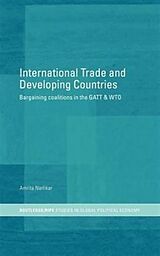International Trade and Developing Countries
Einband:
Fester Einband
EAN:
9780415318594
Untertitel:
Bargaining Coalitions in GATT and WTO
Genre:
Internationale Wirtschaft
Autor:
Amrita Narlikar
Herausgeber:
Taylor & Francis Ltd (Sales)
Anzahl Seiten:
256
Erscheinungsdatum:
04.09.2003
ISBN:
978-0-415-31859-4
Zusatztext 'An important and insightful book of great interest to anyone seeking to understand the dynamics of the past, present and future negotiating rounds, as well as developing country coalition behaviour in other international arenas.'Sean W. Burges, International Affairs'In a nutshell, for everyone interested in understanding how the coalitions of developing countries should be devised and work in negotiations within WTO issues in special Trade in Services, this book is essential reading.'Rogerio de Souza Farias, Political Studies Review"Narlikar's book is a sophisticated and well written analysis that represents a significant contribution to the literature on international trade negotiations."Professor Wyn Grant, Review of International Studies"Narlikar's book is an impressively rigorous and informed study of the role and efficacy of bargaining coalitions, especially but not exclusively of developing countries, for trade negotiations in both the GATT (especially the Uruguay Round) and the WTO (up to Doha). The book is written in an accessible style and provides a valuable addition to the collection of anybody interested in multilateral trade negotiations."Oliver Morrissey, Journal of International Development Informationen zum Autor Amrita Narlikar is Lecturer at the Centre of International Studies, University of Cambridge; Senior Research Associate at the Centre for International Studies, University of Oxford; member of the Economic Negotiations Network based at the University of Southern California, Los Angeles and the Latin American Trade Network, Buenos Aires. Klappentext This book provides a much-needed study of the bargaining coalitions of developing countries in the GATT and WTO. It traces, explains and theorizes on the formation and achievements of coalitions from 1982 to the present day. Bargaining together in groups is common practice in international negotiations and the limited bargaining power of developing countries makes coalitions an especially crucial instrument for their effective diplomacy. This book investigates the relevance and workability of coalitions as an instrument of bargaining power for the weak and analyses the coalition strategies of developing countries at inter-state level. The book focuses principally on coalitions involving developing countries and international trade. Through the case studies of the Uruguay Round and an analytical overview of more recent coalitions, the book fills a gap in the literature of international political economy and international relations. Zusammenfassung This book analyses the much-needed and vastly under-studied subject of bargaining coalitions of developing countries in the GATT and WTO. Inhaltsverzeichnis Introduction: Bargaining Together: Why and How? Coalitions in the GATT and the Entry of Services 1. Bloc Diplomacy: The Informal Group and the G-10 2. Alliance Diplomacy: The Issue-Based, Crossover Coalitions of G-20 and Café au Lait 3. Combination Diplomacy: Issue-Based Blocs and Sub-Sectoral Crossover Coalitions 4. Evolved Alliances: The Cairns Group and Chapter 5. Friends of Services Group 6. Regionalism: A Springboard for Bargaining? 7. Coalitions of the New Round: Developing Countries 8. At Seattle and Doha 9. Conclusion Bibliography ...
Autorentext
Amrita Narlikar is Lecturer at the Centre of International Studies, University of Cambridge; Senior Research Associate at the Centre for International Studies, University of Oxford; member of the Economic Negotiations Network based at the University of Southern California, Los Angeles and the Latin American Trade Network, Buenos Aires.
Klappentext
This book provides a much-needed study of the bargaining coalitions of developing countries in the GATT and WTO. It traces, explains and theorizes on the formation and achievements of coalitions from 1982 to the present day.
Bargaining together in groups is common practice in international negotiations and the limited bargaining power of developing countries makes coalitions an especially crucial instrument for their effective diplomacy. This book investigates the relevance and workability of coalitions as an instrument of bargaining power for the weak and analyses the coalition strategies of developing countries at inter-state level.
The book focuses principally on coalitions involving developing countries and international trade. Through the case studies of the Uruguay Round and an analytical overview of more recent coalitions, the book fills a gap in the literature of international political economy and international relations.
Zusammenfassung
This book analyses the much-needed and vastly under-studied subject of bargaining coalitions of developing countries in the GATT and WTO.
Inhalt
Introduction: Bargaining Together: Why and How? Coalitions in the GATT and the Entry of Services 1. Bloc Diplomacy: The Informal Group and the G-10 2. Alliance Diplomacy: The Issue-Based, Crossover Coalitions of G-20 and Café au Lait 3. Combination Diplomacy: Issue-Based Blocs and Sub-Sectoral Crossover Coalitions 4. Evolved Alliances: The Cairns Group and Chapter 5. Friends of Services Group 6. Regionalism: A Springboard for Bargaining? 7. Coalitions of the New Round: Developing Countries 8. At Seattle and Doha 9. Conclusion Bibliography

Leider konnten wir für diesen Artikel keine Preise ermitteln ...
billigbuch.ch sucht jetzt für Sie die besten Angebote ...
Die aktuellen Verkaufspreise von 5 Onlineshops werden in Realtime abgefragt.
Sie können das gewünschte Produkt anschliessend direkt beim Anbieter Ihrer Wahl bestellen.
Loading...
Die aktuellen Verkaufspreise von 5 Onlineshops werden in Realtime abgefragt.
Sie können das gewünschte Produkt anschliessend direkt beim Anbieter Ihrer Wahl bestellen.
| # | Onlineshop | Preis CHF | Versand CHF | Total CHF | ||
|---|---|---|---|---|---|---|
| 1 | Seller | 0.00 | 0.00 | 0.00 |
